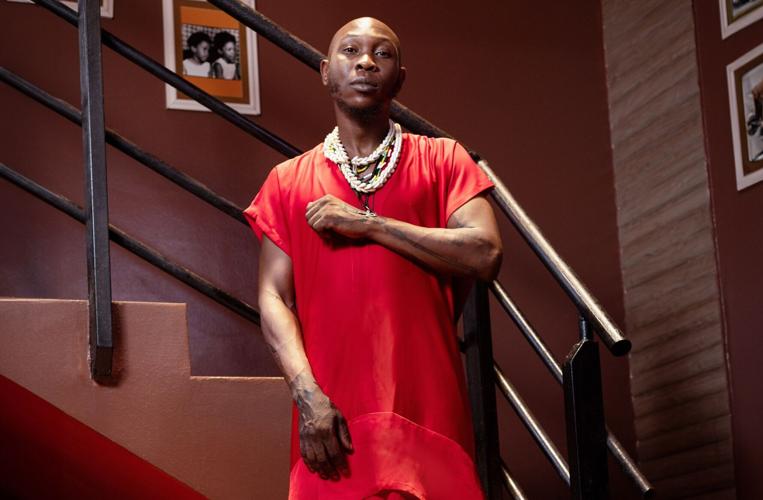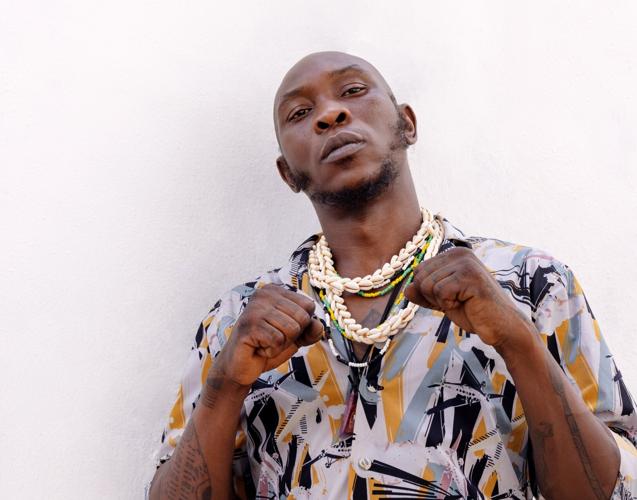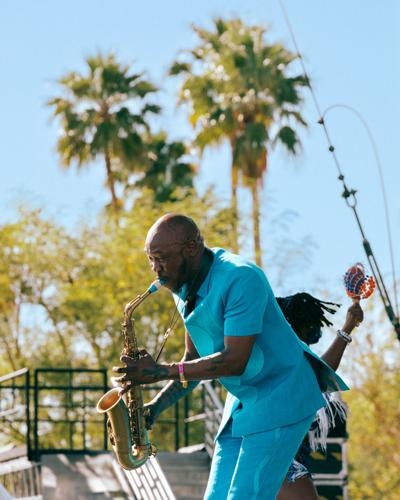
Seun Kuti’s seven-piece band Egypt 80 performs Saturday at The Arts Campus at Willits. He is the son of Afrobeat progenitor and political activist Fela Kuti.
In the last 12 months, Seun (pronounced Shay-oon) Kuti has played the Coachella Valley Music and Arts Festival and Glastonbury Festival, events that draw more than 300,000 people combined.
Saturday night, Kuti — who sings and plays alto saxophone — will bring his seven-piece Afrobeat band from Nigeria, Egypt 80, to The Arts Campus at Willits, a venue that holds 400 people. This show may be one of the sleeper concerts of the year in the Roaring Fork Valley. Certainly, it will be a concert that won’t be forgotten.
Kuti is the youngest son of Fela Kuti, who is recognized as the father of Afrobeat music in addition to being one of the most important African political activists of the latter half of the 20th century.
Fela used his music as a platform to challenge the Nigerian military regimes, and was a spokesman against pan-African corruption, oppression, neo-colonialism, social and political injustice. He was also a voice for Africans all over the world living in oppression.
Seun’s older brother Femi Kuti is also a touring musician who carries the Afrobeat torch of his father. He plays at Belly Up Aspen on August 1.
Kuti started opening up shows for his father’s band Egypt 80 when he was just 9 years old and joined it when he was 12.
Like his father, he left Africa to pursue his musical education in England and attended the Liverpool Institute for the Performing Arts. During his time there, he became a member of the African funk ensemble known as River Niger.
Kuti returned to Nigeria and took over as bandleader of Egypt 80 when his father died in 1997. For close to 30 years, he has preserved and extended his father's political and musical legacy.
Kuti has released four albums with Egypt 80: “Many Things” (2008), “From Africa with Fury” (2011), “A Long Way Beginning” (2014) and the Grammy-nominated “Black Times” (2018).
In October 2024, Kuti released “Heavier Yet (Lays the Crownless Head)," produced by Lenny Kravitz. The deluxe version of the album is set to be released May 30.
Kuti was named to Time Magazine’s “100 Most Influential People” (in the world) list in 2019.
Aspen Daily News interviewed Kuti via Zoom just days after he performed at the 2025 New Orleans Jazz and Heritage Festival. This interview has been condensed for clarity and conciseness.
Aspen Daily News: Having just played Jazz Fest, I’m sure walking around the fairgrounds you can’t help but hear the influences of African music.

Seun Kuti performs at Coachella in April. Kuti has been the leader of the band Egypt 80 since his father Fela Kuti died in 1997.
Seun Kuti: All of that is African music, you know, because it’s African people making this music in all these different places. It just happened that Africans made music that is spread everywhere. People say reggae is Jamaican music. But I don’t say that because Jamaica is just an island. African people went there and made this music there. It’s our music. Just because I drive a German car in Lagos doesn’t suddenly make the car a Nigerian car. It is still a German car, even if it’s built in Lagos and used there.
African music has influenced music globally. There’s no one place where it has not been embraced. What is the blues if it’s not African people making music when they were oppressed in the American south? What is reggae music if it’s not African people in isolation making music that projected their soul from that position?
ADN: How would you describe Afrobeat music?
SK: Afrobeat music is the artistic and musical representation of the reality of African people. It’s African people making music for revolution when they were or are still being oppressed in their own land. I think all our music is an expression of our situation, and a spiritual projection of that situation, wherever we are globally.
ADN: What situation are you referring to?
SK: Whatever the situation may be. The blues stems from a situation of slavery in the United States and that’s the reality of our spiritual yearning to be whole again, to be human again. And that’s where jazz comes in, and R&B and funk and rock, and us becoming more than that which was taken away from us. Our music has always been our way of projecting that which we want for ourselves as African people all over the world.
I think my father was even more influenced by the politics of America in the ‘60s than the music itself in that he was in America at the height of the Civil Rights Movement. The Black Panthers were doing revolutionary work in Los Angeles where he was living and he tied that to his own situation of military dictatorship and oppression in Africa.
ADN: What are your thoughts on what is happening in the United States now?
SK: Any student of history would not find anything happening here now in the United States so mind blowing. Fascism has always been the immune system of capitalism. I think democracy in America has always been under siege since Africans were let into the game. Democracy worked in America until the 1960s when Black people got the vote. The American government and the elite of this country has, through a very sinister, concerted effort, tried to undemocratize the society.
ADN: Aside from racism, what do you think are the underlying causes of the issues we’re seeing in America today?
SK: It stems from shaming poor people, shaming the welfare state, taking help away from people who need it, making people feel less than just because they don’t have. That’s where it all stems from, knowing fully well that those people that don’t have their particular demographic, that they are different from the ruling elites. It has been a steady decline from there.
The only issue I think that is happening today is that Trump’s actions have proven to the world that this is not an innocent mistake. It has always been woven into the system. I think that is really the issue here. I don't think that Americans care that there are racists in America. The Ku Klux Klan is not even considered a terrorist organization. Cops have been killing innocent black people on the streets for a long time. Trump is pulling that Band-Aid off.
ADN: What do you think is most needed from the American people today?
AK: It’s not just America. Our duty globally is to reorganize from a humanist point of view and I think that’s probably what is missing in the American political space, a true revolutionary voice on the side of the people because the elites cannot carry out revolution. It’s impossible. What they carry out is an entrenchment of their privileges. This is just fascism.
We live in a world where people just don’t want to believe in humanity and nature and things like that. They want to believe in other concepts. We cannot accept and respect each other and be one family. We have invested so much of our intellect and imagination in creating things that keep people apart. That’s the concept that we’ve all bought into. These things that make me different from you, that show me that I’m better than you, more successful than you.
ADN: What is the core message that you’re trying to convey through your music?
SK: Well, my message is very straightforward. I believe in the working class and poor people of the world, and I believe that we are the inheritors of this planet. We are the only ones that care about this planet. We are the only ones that keep this world going. If we acted the way the rich and elite and the powerful of this world acted, there would be no world for anybody to live in. If we disbelieved in law and morals and ethics the way the elites do, there will be no world for anybody to live in.
ADN: Where does joy play in the music? Because your music is very joyful.
SK: The joy is in the sound. All my lyrics, even when I talk about love, I talk about love from a revolutionary perspective. So all my lyrics basically are political. But my music is the joy.

Seun Kuti plays at TACAW Saturday. Fresh off of performances at Coachella Valley Music and Arts Festival and New Orleans Jazz and Heritage Festival, Saturday’s show promises to be a more intimate affair. DJ Low Key from Denver will open the show at 8 p.m.
ADN: What is your father’s legacy?
SK: My father’s legacy is definitely his music more than anything else. That’s the gift he has given the world. And that’s why today there are so many Afrobeat bands all over the world, from Lagos to Chicago, to Laos, to Vietnam, to cities all over the world. There are always bands that have something to say about their people’s liberation, people’s existence. I think that my dad’s greatest legacy to the world was to express that through music and provide a platform for others to do so.
ADN: You’ve said your dad was spiritualized in 1980 and that’s why he took on the name Egypt 80 for the band. But I’ve read that you’re an atheist.
SK: I’m an atheist as far as I don’t believe in some dominating, all encompassing god. But I’m re-spiritualizing because for some time I’ve had spiritual encounters, and they are not in the sense of what the western concept of spiritualization might be. When I feel something and I encounter things that are connecting me with humanity, with nature, with things around me and I feel my ancestors are speaking to me, I understand that there’s something that connects us all and leads us to do certain things at certain times. I’m more confident in my calling. If atheism is a denial of everything that cannot be scientifically explained then I can’t say I’m an atheist anymore.
ADN: What do you hope people take away when they come and see you play?
SK: I hope they leave thinking that they just saw an artist that is doing his best to change the world.




